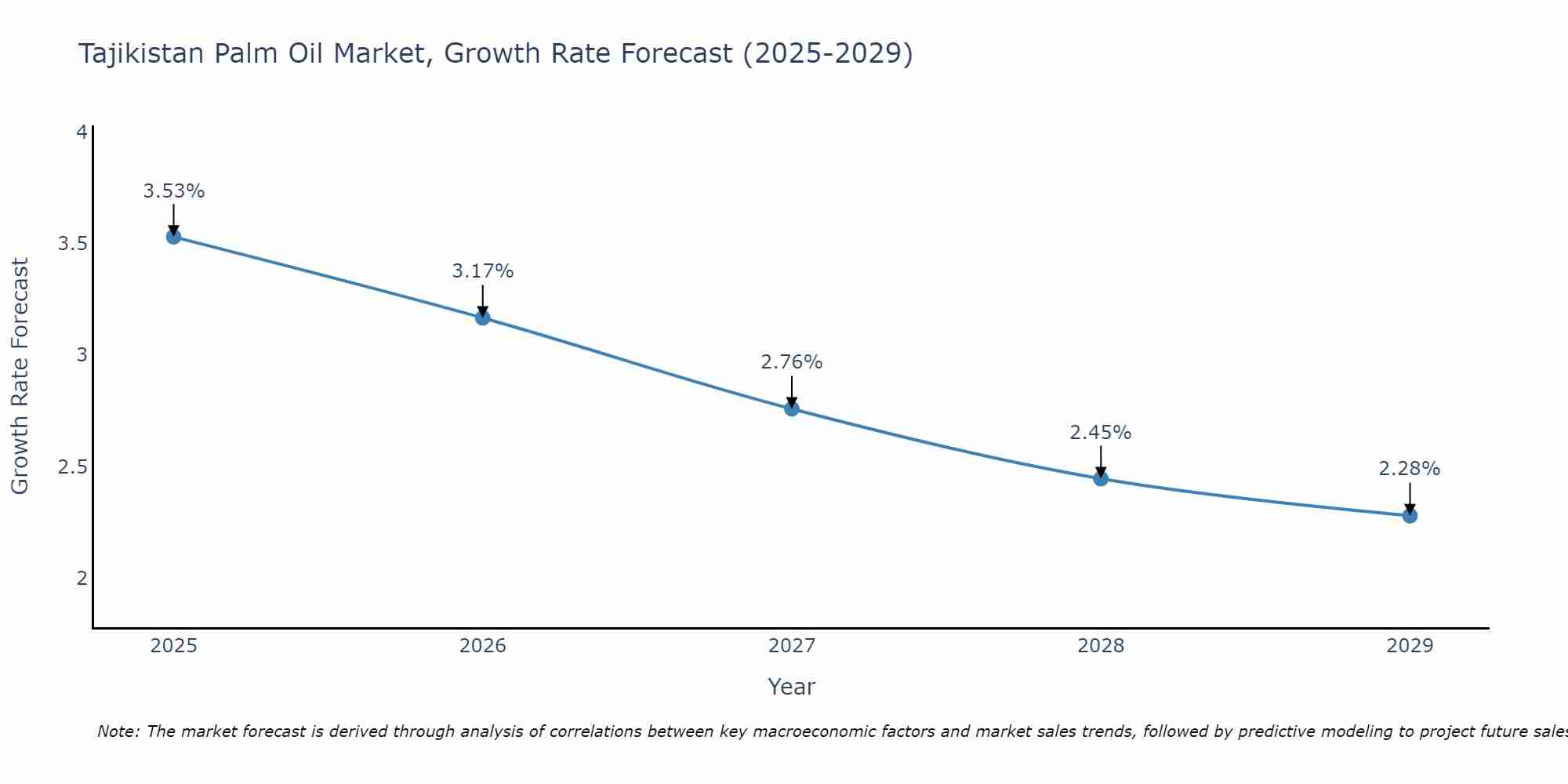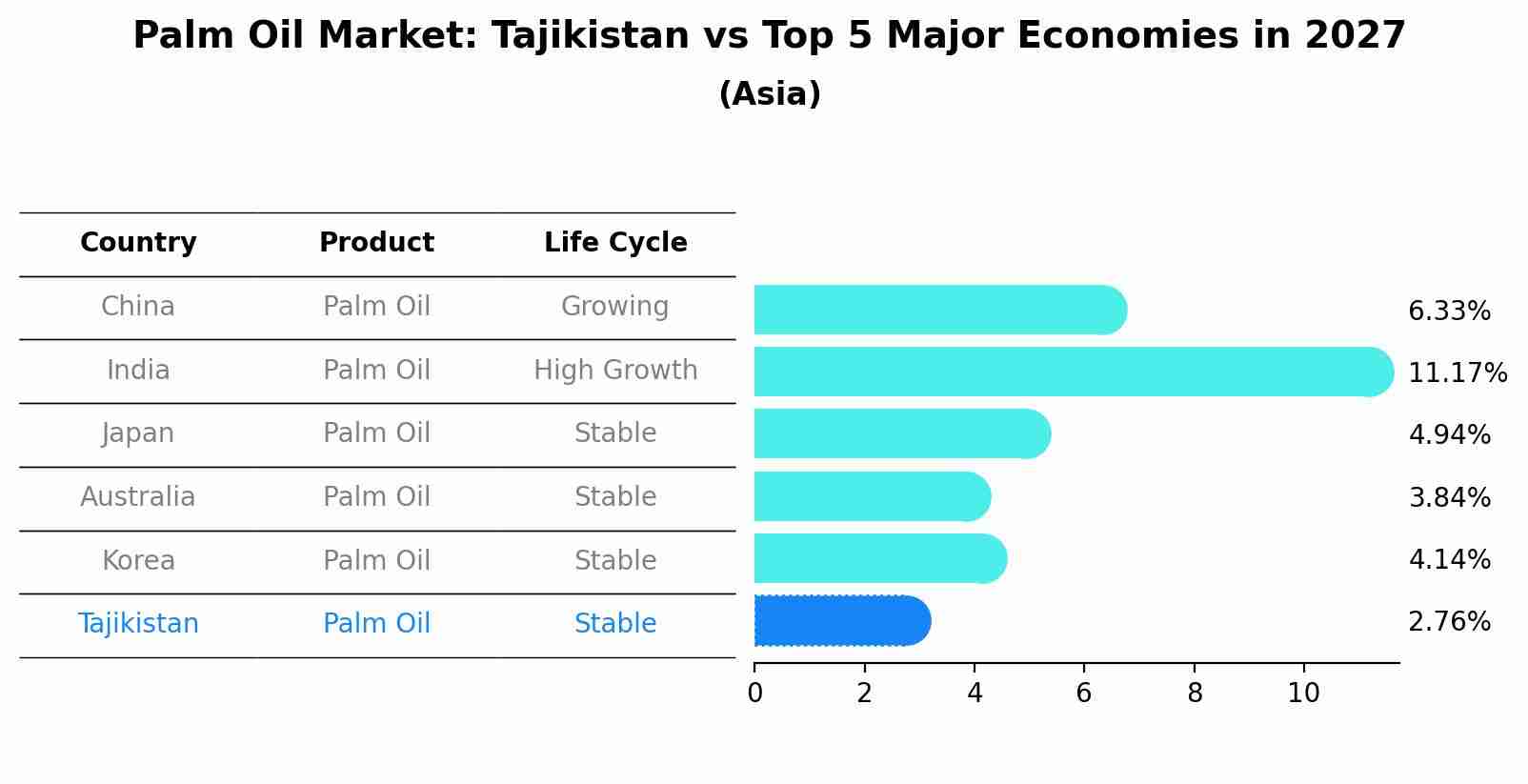Tajikistan Palm Oil Market (2025-2031) Outlook | Companies, Growth, Trends, Industry, Revenue, Value, Size, Forecast, Analysis & Share
| Product Code: ETC383819 | Publication Date: Aug 2022 | Updated Date: Jul 2025 | Product Type: Market Research Report | |
| Publisher: 6Wresearch | Author: Sumit Sagar | No. of Pages: 75 | No. of Figures: 35 | No. of Tables: 20 |
Tajikistan Palm Oil Market Size Growth Rate
The Tajikistan Palm Oil Market may undergo a gradual slowdown in growth rates between 2025 and 2029. Beginning strongly at 3.53% in 2025, growth softens to 2.28% in 2029.

Palm Oil Market: Tajikistan vs Top 5 Major Economies in 2027 (Asia)
Tajikistan's Palm Oil market is anticipated to experience a stable growth rate of 2.76% by 2027, reflecting trends observed in the largest economy China, followed by India, Japan, Australia and South Korea.

Tajikistan Palm Oil Market Synopsis
The Tajikistan palm oil market is relatively small compared to other countries in the region, with a growing demand primarily driven by the food processing industry. While domestic palm oil production is limited, Tajikistan relies heavily on imports to meet its consumption needs. The market is characterized by a mix of both refined and crude palm oil products, with refined palm oil being more popular due to its versatility in various cooking applications. The increasing consumer awareness about the health and environmental concerns related to palm oil production has led to a growing demand for sustainably sourced palm oil products in the country. Overall, the Tajikistan palm oil market is expected to witness steady growth in the coming years, driven by the expanding food industry and changing consumer preferences.
Tajikistan Palm Oil Market Trends
As of now, the Tajikistan Palm Oil Market is experiencing a growing demand due to its versatile applications in food processing, cosmetics, and biofuel industries. The market is witnessing a shift towards sustainable sourcing practices and increasing consumer awareness about the environmental impact of palm oil production. Importantly, there is a rising preference for certified sustainable palm oil products among consumers and businesses in Tajikistan. Additionally, government initiatives promoting domestic palm oil production to reduce reliance on imports and boost the local economy are gaining traction. Overall, the Tajikistan Palm Oil Market is moving towards sustainability and self-sufficiency, with a focus on ethical sourcing practices and environmental responsibility.
Tajikistan Palm Oil Market Challenges
In the Tajikistan Palm Oil Market, some of the key challenges include limited domestic production capacity, high import costs, and competition from other vegetable oils. Due to the country`s mountainous terrain and harsh climate conditions, there is a lack of suitable land for palm oil cultivation, leading to heavy reliance on imports. High transportation costs and import duties contribute to the overall expensive nature of palm oil in the market. Additionally, consumers in Tajikistan have a preference for traditional vegetable oils like cottonseed and sunflower oil, posing a challenge for palm oil market penetration. These factors make it challenging for palm oil to gain a significant market share in Tajikistan and require strategic planning and market positioning for companies operating in this industry.
Tajikistan Palm Oil Market Investment Opportunities
The Tajikistan palm oil market presents promising investment opportunities due to the growing demand for palm oil in the country. With an increasing population and rising disposable incomes, the demand for palm oil as a key ingredient in the food industry is on the rise. Investing in palm oil plantations or distribution channels in Tajikistan could be lucrative as the market continues to expand. Additionally, palm oil is also used in various non-food industries such as cosmetics and biofuels, providing diverse investment avenues. However, potential investors should also consider the environmental and social impact of palm oil production and ensure sustainable practices are implemented to mitigate risks and enhance long-term profitability in the Tajikistan market.
Jordan Agar Market Government Policies
The Tajikistan government has implemented policies aimed at promoting domestic palm oil production to reduce reliance on imports. In 2019, the government introduced a ban on the import and sale of palm oil, incentivizing local companies to invest in palm oil production. The Ministry of Agriculture has also provided support to farmers through subsidies and technical assistance to increase palm oil cultivation. Additionally, the government has encouraged research and development initiatives to improve the efficiency and competitiveness of the domestic palm oil industry. These policies aim to enhance food security, reduce import dependence, and create employment opportunities in the palm oil sector in Tajikistan.
Tajikistan Palm Oil Market Future Outlook
The future outlook for the Tajikistan Palm Oil Market appears positive with steady growth anticipated in the coming years. Increasing consumer awareness about the health benefits of palm oil, its versatile applications in food products, and the rising demand from industries such as cosmetics and biofuels are expected to drive market growth. Additionally, government initiatives to promote agricultural development and attract foreign investment in the palm oil sector are likely to further boost market expansion. However, challenges such as limited domestic production capacity and dependency on imports may impact the market`s growth potential. Overall, with supportive factors in place, the Tajikistan Palm Oil Market is poised for a promising future trajectory.
Key Highlights of the Report:
- Tajikistan Palm Oil Market Outlook
- Market Size of Tajikistan Palm Oil Market, 2024
- Forecast of Tajikistan Palm Oil Market, 2031
- Historical Data and Forecast of Tajikistan Palm Oil Revenues & Volume for the Period 2021 - 2031
- Tajikistan Palm Oil Market Trend Evolution
- Tajikistan Palm Oil Market Drivers and Challenges
- Tajikistan Palm Oil Price Trends
- Tajikistan Palm Oil Porter's Five Forces
- Tajikistan Palm Oil Industry Life Cycle
- Historical Data and Forecast of Tajikistan Palm Oil Market Revenues & Volume By Nature for the Period 2021 - 2031
- Historical Data and Forecast of Tajikistan Palm Oil Market Revenues & Volume By Organic for the Period 2021 - 2031
- Historical Data and Forecast of Tajikistan Palm Oil Market Revenues & Volume By Conventional for the Period 2021 - 2031
- Historical Data and Forecast of Tajikistan Palm Oil Market Revenues & Volume By Product for the Period 2021 - 2031
- Historical Data and Forecast of Tajikistan Palm Oil Market Revenues & Volume By CPO for the Period 2021 - 2031
- Historical Data and Forecast of Tajikistan Palm Oil Market Revenues & Volume By RBD Palm Oil for the Period 2021 - 2031
- Historical Data and Forecast of Tajikistan Palm Oil Market Revenues & Volume By Palm Kernel Oil for the Period 2021 - 2031
- Historical Data and Forecast of Tajikistan Palm Oil Market Revenues & Volume By Fractionated Palm Oil for the Period 2021 - 2031
- Historical Data and Forecast of Tajikistan Palm Oil Market Revenues & Volume By End-use for the Period 2021 - 2031
- Historical Data and Forecast of Tajikistan Palm Oil Market Revenues & Volume By Food & Beverage for the Period 2021 - 2031
- Historical Data and Forecast of Tajikistan Palm Oil Market Revenues & Volume By Personal Care & Cosmetics for the Period 2021 - 2031
- Historical Data and Forecast of Tajikistan Palm Oil Market Revenues & Volume By Biofuel & Energy for the Period 2021 - 2031
- Historical Data and Forecast of Tajikistan Palm Oil Market Revenues & Volume By Pharmaceuticals for the Period 2021 - 2031
- Historical Data and Forecast of Tajikistan Palm Oil Market Revenues & Volume By Others for the Period 2021 - 2031
- Tajikistan Palm Oil Import Export Trade Statistics
- Market Opportunity Assessment By Nature
- Market Opportunity Assessment By Product
- Market Opportunity Assessment By End-use
- Tajikistan Palm Oil Top Companies Market Share
- Tajikistan Palm Oil Competitive Benchmarking By Technical and Operational Parameters
- Tajikistan Palm Oil Company Profiles
- Tajikistan Palm Oil Key Strategic Recommendations
Frequently Asked Questions About the Market Study (FAQs):
- Single User License$ 1,995
- Department License$ 2,400
- Site License$ 3,120
- Global License$ 3,795
Search
Thought Leadership and Analyst Meet
Our Clients
Related Reports
- Afghanistan Rocking Chairs And Adirondack Chairs Market (2026-2032) | Size & Revenue, Competitive Landscape, Share, Segmentation, Industry, Value, Outlook, Analysis, Trends, Growth, Forecast, Companies
- Afghanistan Apparel Market (2026-2032) | Growth, Outlook, Industry, Segmentation, Forecast, Size, Companies, Trends, Value, Share, Analysis & Revenue
- Canada Oil and Gas Market (2026-2032) | Share, Segmentation, Value, Industry, Trends, Forecast, Analysis, Size & Revenue, Growth, Competitive Landscape, Outlook, Companies
- Germany Breakfast Food Market (2026-2032) | Industry, Share, Growth, Size, Companies, Value, Analysis, Revenue, Trends, Forecast & Outlook
- Australia Briquette Market (2025-2031) | Growth, Size, Revenue, Forecast, Analysis, Trends, Value, Share, Industry & Companies
- Vietnam System Integrator Market (2025-2031) | Size, Companies, Analysis, Industry, Value, Forecast, Growth, Trends, Revenue & Share
- ASEAN and Thailand Brain Health Supplements Market (2025-2031) | Strategy, Consumer Insights, Analysis, Investment Trends, Opportunities, Growth, Size, Share, Industry, Revenue, Segments, Value, Segmentation, Supply, Forecast, Restraints, Outlook, Competition, Drivers, Trends, Demand, Pricing Analysis, Competitive, Strategic Insights, Companies, Challenges
- ASEAN Bearings Market (2025-2031) | Strategy, Consumer Insights, Analysis, Investment Trends, Opportunities, Growth, Size, Share, Industry, Revenue, Segments, Value, Segmentation, Supply, Forecast, Restraints, Outlook, Competition, Drivers, Trends, Demand, Pricing Analysis, Competitive, Strategic Insights, Companies, Challenges
- Europe Flooring Market (2025-2031) | Outlook, Share, Industry, Trends, Forecast, Companies, Revenue, Size, Analysis, Growth & Value
- Saudi Arabia Manlift Market (2025-2031) | Outlook, Size, Growth, Trends, Companies, Industry, Revenue, Value, Share, Forecast & Analysis
Industry Events and Analyst Meet
Whitepaper
- Middle East & Africa Commercial Security Market Click here to view more.
- Middle East & Africa Fire Safety Systems & Equipment Market Click here to view more.
- GCC Drone Market Click here to view more.
- Middle East Lighting Fixture Market Click here to view more.
- GCC Physical & Perimeter Security Market Click here to view more.
6WResearch In News
- Doha a strategic location for EV manufacturing hub: IPA Qatar
- Demand for luxury TVs surging in the GCC, says Samsung
- Empowering Growth: The Thriving Journey of Bangladesh’s Cable Industry
- Demand for luxury TVs surging in the GCC, says Samsung
- Video call with a traditional healer? Once unthinkable, it’s now common in South Africa
- Intelligent Buildings To Smooth GCC’s Path To Net Zero


















